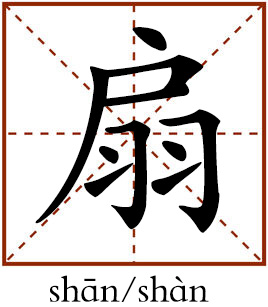Fan

This character has two tones. When pronounced as shān, it is used as a verb, referring to slapping or flapping. When pronounced as shàn, it is a noun with reference to a fan. The handheld fan was an important cultural symbol in China, representing the owner’s social status as a member of the literati or an upper-class lady.
羽扇纶巾
yǔ shàn guān jīn
Yu refers to feather and yu shan refers to feather fans. Guan jin refers to a silk headdress for males in ancient China. This idiom is often used to describe a military commander who wears a silk headdress and flaps a feather fan when directing operations during a battle. It represents a calm and confident image of a military commander. Many Chinese literary works associate this idiom with one of the most accomplished strategists in ancient China, Zhuge Liang (181–234), who helped Liu Bei to found the Shu-Han Dynasty (221–263/264) with his great wisdom.
This idiom originated from the famous poem, “Chibi Huaigu” (“The Red Cliff”) by the great Song literati Su Shi (1037–1101)—“I fancied General Zhou at the height of his success, with a plume fan in hand,/ In a silk hood, so brave and bright,/ Laughing and jesting with his bride so fair,/ While enemy ships were destroyed as planned like castles in the air.” Su composed this poem when he visited Red Cliff, where the well-known military general in the Three Kingdoms Period, Zhou Yu (175–210), played the leading role in defeating the numerically superior forces of the northern warlord Cao Cao at the Battle of Red Cliffs in 208. As this lyric was written in 1082 when the poet’s life was full of cares and pressures, Su fancied if General Zhou revisited the battlefield at Red Cliff, he would laugh away his cares and grieve over the inevitable reality of his situation.
Su merged the moonlit and wave-washed scenery of Red Cliff with the history of great heroes. He transcended space and time. His unworldly aspiration and upright personality broadened his mind to transform sorrow into joy.
Now this idiom is often used to illustrate people who can do something successfully while looking effortless and relaxed, because they have great intelligence or ability and make decisions after much deliberation.
(edited by REN GUANHONG)
